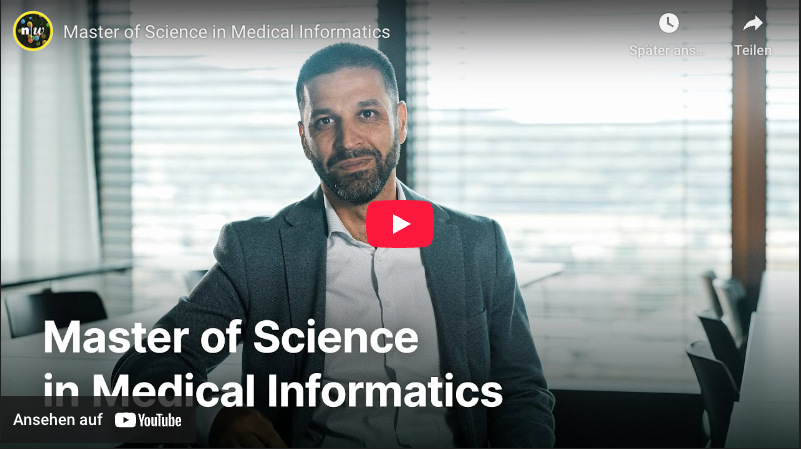MSc of Science - Medical Informatics
Hochschule für Life Sciences FHNW
Ready to shape the future of healthcare? Join our Master's programme in Medical Informatics and play a key role in the digital transformation of healthcare. Learn how to analyze complex medical data, develop innovative software solutions and apply artificial intelligence to improve patient care. If you're passionate about technology and want to make a real impact in healthcare, this programme is for you.

Steckbrief
Zukunftsaussichten
Combining doctors' expertise with the power of AI is key to unlocking the full potential of modern medicine.
Dr. Uri Nahum Dean of MSc Medical Informatics
What career opportunities are open to you?
With our Master’s degree in Medical Informatics and Pharma Informatics you will unlock outstanding career opportunities at the intersection of medicine/pharma, IT and innovation. You will analyze health data, develop smart IT solutions, and help design digital processes in hospitals, research and industry.
Thanks to your combined medical and technical expertise, you will be highly qualified for roles in:
- Hospitals and Healthcare Companies: Optimize clinical workflows, diagnostics and treatment options through innovative digital solutions.
- The Pharma Industry: Apply your knowledge of big data and artificial intelligence to accelerate drug development and enable personalized therapies.
- Medtech Companies: Work at the interface of technology, software and clinical application, designing innovative products that improve the lives of patients and healthcare professionals.
- Start-ups and Health Tech Companies: Contribute your medical knowledge and IT skills to drive forward innovative projects in the digital health space.
- Research Institutions: Collaborate in interdisciplinary teams to develop algorithms, digital diagnostic tools and clinical decision support systems.
Aufbau und Inhalte
Two Specializations
Module Groups
Details about the programme
Vertiefungen
International
The FHNW School of Life Sciences has over 20 international partner schools around the world. Students can spend a semester at a foreign university as part of their master's degree programme.
Further information about our partner schools. (Link auf entsprechende Seite einfügen)
Leitung und Dozierende
Voraussetzungen, Zulassung, Eignungsabklärung
Designed for BSc graduates in Medical Informatics, as well as related disciplines such as Computer Science/Informatics, Medicine (MSc in Medicine or equivalent), Pharmaceutical Sciences, Life Sciences, or similar fields that meet the programming/medical knowledge requirements.
Highly qualified graduates are admitted to the master’s programme if they:
- have acquired a Bachelor's degree in a relevant field with a grade of A, B or ≥ 4.8 (≥ "good")
or - possess an equivalent educational background and professional experience (college or university degree)
- and have successfully passed the interview
- and demonstrate a very good command of the English language.
Pre-master’s courses are available for reflecting the required prior knowledge. Completion of these courses may be declared by the Admissions Committee as a prerequisite for starting the programme. These courses begin before the semester starts and are free of charge.
Pre-master’s courses are available in: Digital Life Sciences, Programming, Mathematics and Business Information Systems.
Proof of sufficient English skills must be provided with one of the following certificates:
-
Organisatorisches
